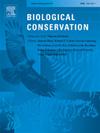Improving human well-being through community-led coastal restoration
IF 4.9
1区 环境科学与生态学
Q1 BIODIVERSITY CONSERVATION
引用次数: 0
Abstract
Coastal and marine conservation efforts are largely motivated by the ecological benefits of healthy habitats and their ecosystem services. Ecosystem restoration is a human endeavour, yet there is a paucity of research on the well-being benefits that people derive from participating in conservation. Focusing on the coastal communities of southern Australia, we explore the emotional, psychological, and social well-being benefits of participating in coastal conservation activities, and how these interact with ecological grief and anxiety. We surveyed individuals that regularly volunteer in coastal conservation, individuals who regularly use the coastal environment for leisure (recreational fishers), and those that do neither (control group). Our results suggest that engaging in marine conservation or recreational fishing improves social and psychological well-being. Volunteers also self-report better emotional well-being, while fishers do not. Although levels of ecological grief and anxiety were consistent across groups, our findings indicate that volunteering in coastal conservation may remedy the negative impacts on well-being from high levels of ecological anxiety and grief. We show that well-being benefits derived from volunteering are distinct from other nature-based recreational activities. These results illustrate that, for coastal societies, participating in community-led restoration projects provides human well-being benefits that are unique from other coastal activities, yet are seldom documented by conservation research. Recognising the social value of conservation activities is integral to effectively estimating the socio-ecological benefits of ecosystem restoration.
求助全文
约1分钟内获得全文
求助全文
来源期刊

Biological Conservation
环境科学-环境科学
CiteScore
10.20
自引率
3.40%
发文量
295
审稿时长
61 days
期刊介绍:
Biological Conservation is an international leading journal in the discipline of conservation biology. The journal publishes articles spanning a diverse range of fields that contribute to the biological, sociological, and economic dimensions of conservation and natural resource management. The primary aim of Biological Conservation is the publication of high-quality papers that advance the science and practice of conservation, or which demonstrate the application of conservation principles for natural resource management and policy. Therefore it will be of interest to a broad international readership.
 求助内容:
求助内容: 应助结果提醒方式:
应助结果提醒方式:


